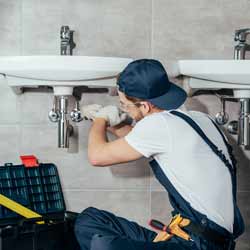Plumber Careers
What is one thing you use in your house everyday? The plumbing. Whether you’re washing dishes, flushing the toilet, or taking a shower – plumbing is an essential part of your life. Imagine life without proper plumbing. Yikes! It sure would be different.
Take a look in your crawl space or utility closet. See all of those pipes? There are even more below your feet in the floor and behind the walls. In fact, any pipes dealing with water, steam, gas, waste, or sewage are a plumber’s handiwork. You certainly want your plumbing system to function properly. Imagine the mess if there was a problem.

Plumbers are tradesmen who install, maintain, and repair plumbing systems. It’s the plumber’s job to make sure that the plumbing system functions properly in both residential and commercial settings. Plumbers are contracted to do things like run water pipes through a new apartment building, detect a leaky pipe in a cold and cramped crawl space, stop a gushing joint in the middle of the night, install sinks in an office building, fix frozen pipes in the middle of January, snake a clogged toilet in the suburbs, or refit and solder new pipes for a construction project. Plumbers to a wide variety of things that deal with plumbing systems of all shapes and sizes in homes, businesses, and factories.
Wherever you live, there are plumbers nearby. Plumbers are constantly in demand. Between new construction projects, routine maintenance, and emergency plumbing disasters, plumbers stay pretty busy. That means it’s a great job if you want job security.
To become a plumber, you need to have a high school diploma or the equivalent. Next, you need to pursue an apprenticeship with a master plumber. During your 5 year plumbing apprenticeship, you will learn the plumbing trade. Under the leadership of an experienced plumber, you will learn about building codes, plumbing theory, backflow principles, piping, tools, how to read blueprints, project estimations, and more. Each year of the apprenticeship requires 1700 to 2000 hours of paid on the job training and a minimum of 246 hours of technical education. Some aspiring plumbers choose to go to community college or technical school to learn more about the trade.
After you complete your apprenticeship, you can become a licensed journeyman and eventually a master plumber. To climb this ladder, you need to apply for a state license and pass a state licensing exam. Each state has its own licensing process. Once you are a master plumber, you will work standard hours, unless you choose to be on call for plumbing emergencies like midnight floods or burst pipes.
Many plumbers run their own businesses. Some work for established plumbing companies. Others are permanently employed by resorts or hotels. Either way, plumbers typically join a plumber’s union and find they have steady work. According to the Bureau of Labor Statistics, in 2016, plumbers made $51,420 per year or $4.74 per hour. There were a total of 480,000 plumbers and pipefitters in the US in 2016 and that number is expected to grow by 21% by 2024.
If you have a working toilet, washing machine, dishwasher, water heater, shower, tub, or sink, thank a plumber. If something doesn’t work, call a plumber! It’s always a good idea to keep a plumber’s number in your phone, just in case. Plumbers provide an essential service that we all rely on every day. Are you looking for a cool career that offers great job security and opportunities everywhere? Why not become a plumber?
Quick Facts About Plumber Careers
Job Title: Plumber
Office: Commercial and Residential Buildings
Description: Install, maintain, and repair plumbing systems
Certifications/Education: No formal education, 5 year apprenticeship, state licensing
Necessary Skills: Knowledgeable of plumbing systems
Potential Employers: Self-Employer, Established Plumbing Companies
Pay: $49,140 per year or $23.62 per hour


 Teach English in Asia
Teach English in Asia  Cruise Ship Jobs
Cruise Ship Jobs  Alaska Fishing Industry Jobs
Alaska Fishing Industry Jobs  Sharing Economy / Gig Economy
Sharing Economy / Gig Economy